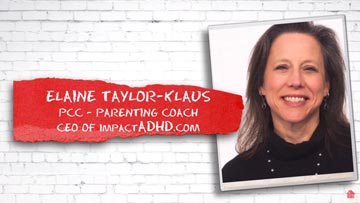Full Interview with Elaine Taylor (How To Thrive with ADHD Live Tv Show)
Related Videos
Transcript
Expert Bio
More from Expert
Elaine Taylor-Klaus, PCCParenting Coach
Elaine Taylor-Klaus is a change agent: a mother of 3 complex kids, a parent educator, a writer, a health care advocate, a community entrepreneur, a public speaker, a facilitator, and a compassionate listener. She is also a certified professional coach, providing support for families around the globe raising children with complex needs.
Elaine feels passionately that parents deserve compassionate guidance and effective skills when raising “complex” children. She coaches and trains parents to take a “coach-approach” to parenting, empowering their children to lead independent, fulfilling lives.
The co-founder and CEO of ImpactADHD.com, a virtual training and coaching resource for parents of kids with ADHD and related challenges, Elaine is a writer for publications like Huffington Post, Attention and ADDitude magazines. A regular presenter at national conferences, such as CHADD (Children & Adults with ADD) and the LDA (Learning Disability Association of America), she serves on the national Board of Directors of CHADD, chairing the Membership committee. She also serves as an expert voice for parents as part of Pfizer’s Making Moments education campaign.
Prior to coaching, Elaine served for 8 years on the Executive Committee of Georgia’s Governor's Council for Maternal and Infant Health, and worked in the field of women’s health care on a national level. She is a graduate of Wesleyan University in CT, a CORO Fellowship, and CTI’s Co-Active Leadership Program, and is part of Georgia State University’s Activist Women’s Archives.
Elaine is the mom in an ADHD Family of Five, living in Atlanta, GA with her children and husband, David Taylor-Klaus of DTKCoaching.




 GET ACCESS TO ALL PREMIUM CONTENT WITH NO ADS FOR $4.99/MONTH
GET ACCESS TO ALL PREMIUM CONTENT WITH NO ADS FOR $4.99/MONTH




Login or Register to view and post comments